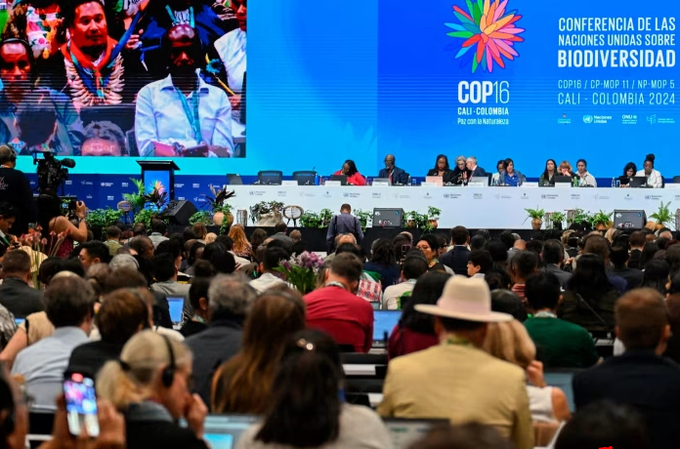May 21, 2025 | 11:55 GMT +7
May 21, 2025 | 11:55 GMT +7
Hotline: 0913.378.918
May 21, 2025 | 11:55 GMT +7
Hotline: 0913.378.918

The opening ceremony of the COP16 summit on October 21.
Pharmaceutical and agricultural companies are among the industry groups pushing against a proposed levy on their returns from products made using genetic data from nature.
Negotiators are wrangling over a deal at the UN COP16 biodiversity summit under way in Colombia around payment for the use of the data known as digital sequence information (DSI), used heavily by makers of drugs and agricultural products.
The data is collected by academic researchers from around the world and made widely available on publicly funded, open-access databases.
Companies ranging from AstraZeneca and GSK to Bayer access the information mainly for free, but nations agreed at the last COP15 summit to establish a multilateral fund for “benefit-sharing” from its use.
The details of how companies and other entities will pay into a fund, and how the money will be distributed, are among the issues at the centre of the second and final week of negotiations at COP16.
The most contentious option, put forward by a group of African nations, would impose a levy of 1 per cent of the retail value of all products made using DSI.
Accredited observers at the talks said momentum was instead building behind an alternative proposal that would see companies in sectors that benefit from the data pay a smaller percentage of annual sales or profit.
But national negotiators remained far from a consensus on what the rate should be, and whether it should be levied on sales or profit, or whether contributions should be voluntary or mandatory. Another key contention is whether countries’ income from the multilateral fund should depend on how much money is generated from their genetic data, or on the nations’ need of funds to conserve biodiversity.
Developed countries, where the biggest corporate users of genetic data are based, were broadly backing a system of voluntary contributions, said Nithin Ramakrishnan, a researcher at Third World Network, a non-profit organisation with official observer status.
Developing nations, where much of the world’s biodiversity is located, were in favour of mandatory corporate payments, he said.
“I’m afraid, as is often the case in access and benefit sharing issues since [the UN biodiversity convention was created in] 1992, there’s a kind of geopolitical divide between developed and developing countries,” said Michael Halewood, a genetic resources expert at the global Consultative Group on International Agricultural Research, also an observer to the talks.
German pharmaceutical and agricultural conglomerate Bayer said the additional cost for companies could feed through into higher prices for food and other products.
“It’s the value chain that you have to consider,” said Jasmina Muminovic, Bayer’s head of genetic resources. “It doesn’t end with us producing and selling seeds. Somebody buys that seed, paying more, and [their product becomes] a little more expensive.”
Companies from an array of sectors have sent teams of representatives to COP16 in the tropical city of Cali, causing some national delegates to worry about the influence of corporate lobbying.
The Business for Nature group represented at the summit also organised signatories from pharma to food to energy and packaging among a 230-strong corporate line-up for an open letter aimed at governments.
In a statement at the start of the conference, a global pharma industry trade group said it had “serious concerns” about a levy. A tax-based system “would increase costs across the board, disproportionately impacting cutting-edge sectors that may rely on efficient access to DSI”, it said.
Some European companies say the new rules could put them at a disadvantage to US rivals that might not be subject to any new requirements. The US and the Holy See are the only UN members not to have ratified the Convention on Biological Diversity, the framework under which COP16 is being held.
Dominic Muyldermans, a lawyer representing agricultural technology lobby group CropLife International at COP16, said companies were concerned about the prospect of an emerging “patchwork” of rules and restrictions.
CropLife argues that demands for payment from the new multilateral system as well as from individual nations could “disincentivise innovation” in health and food security.
By contrast, environmental groups have described the corporate use of genetic data without payment as “biopiracy”.
Susana Muhamad, Colombian environment minister and president of COP16, told the Financial Times the issue of payment would prove a test of the international system’s capacity to pursue policy change in the face of resistance from vested interests.
However, the large business presence at the gathering was a welcome development, she added. “The corporate influence would be there with or without that presence, because they lobby through the countries themselves,” Muhamad said.
Discussions on DSI were proceeding “in a very productive way” but involvement at the ministerial level would likely be needed to reach an agreement, she said.
(Financial Times)

(VAN) Attempts to bring down the price of the Japanese staple have had little effect amid a cost-of-living crisis.

(VAN) Fourth most important food crop in peril as Latin America and Caribbean suffer from slow-onset climate disaster.

(VAN) Shifting market dynamics and the noise around new legislation has propelled Trouw Nutrition’s research around early life nutrition in poultry. Today, it continues to be a key area of research.

(VAN) India is concerned about its food security and the livelihoods of its farmers if more US food imports are allowed.

(VAN) FAO's Director-General emphasises the need to work together to transform agrifood systems.

(VAN) Europe is facing its worst outbreak of foot-and-mouth since the start of the century.

(VAN) The central authorities, in early April, released a 10-year plan for rural vitalization.